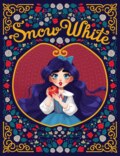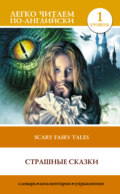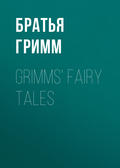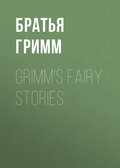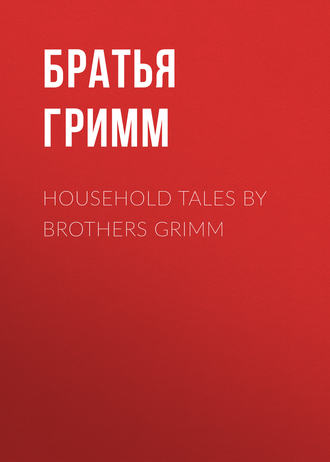
Братья Гримм
Household Tales by Brothers Grimm
169 The Hut in the Forest
A poor wood-cutter lived with his wife and three daughters in a little hut on the edge of a lonely forest. One morning as he was about to go to his work, he said to his wife, "Let my dinner be brought into the forest to me by my eldest daughter, or I shall never get my work done, and in order that she may not miss her way," he added, "I will take a bag of millet with me and strew the seeds on the path." When, therefore, the sun was just above the center of the forest, the girl set out on her way with a bowl of soup, but the field-sparrows, and wood-sparrows, larks and finches, blackbirds and siskins had picked up the millet long before, and the girl could not find the track. Then trusting to chance, she went on and on, until the sun sank and night began to fall. The trees rustled in the darkness, the owls hooted, and she began to be afraid. Then in the distance she perceived a light which glimmered between the trees. "There ought to be some people living there, who can take me in for the night," thought she, and went up to the light. It was not long before she came to a house the windows of which were all lighted up. She knocked, and a rough voice from inside cried, "Come in." The girl stepped into the dark entrance, and knocked at the door of the room. "Just come in," cried the voice, and when she opened the door, an old gray-haired man was sitting at the table, supporting his face with both hands, and his white beard fell down over the table almost as far as the ground. By the stove lay three animals, a hen, a cock, and a brindled cow. The girl told her story to the old man, and begged for shelter for the night. The man said,
"Pretty little hen, Pretty little cock, And pretty brindled cow, What say ye to that?"
"Duks," answered the animals, and that must have meant, "We are willing," for the old man said, "Here you shall have shelter and food, go to the fire, and cook us our supper." The girl found in the kitchen abundance of everything, and cooked a good supper, but had no thought of the animals. She carried the full dishes to the table, seated herself by the gray-haired man, ate and satisfied her hunger. When she had had enough, she said, "But now I am tired, where is there a bed in which I can lie down, and sleep?" The animals replied,
"Thou hast eaten with him, Thou hast drunk with him, Thou hast had no thought for us, So find out for thyself where thou canst pass the night."
Then said the old man, "Just go upstairs, and thou wilt find a room with two beds, shake them up, and put white linen on them, and then I, too, will come and lie down to sleep." The girl went up, and when she had shaken the beds and put clean sheets on, she lay down in one of them without waiting any longer for the old man. After some time, however, the gray-haired man came, took his candle, looked at the girl and shook his head. When he saw that she had fallen into a sound sleep, he opened a trap-door, and let her down into the cellar.
Late at night the wood-cutter came home, and reproached his wife for leaving him to hunger all day. "It is not my fault," she replied, "the girl went out with your dinner, and must have lost herself, but she is sure to come back to-morrow." The wood-cutter, however, arose before dawn to go into the forest, and requested that the second daughter should take him his dinner that day. "I will take a bag with lentils," said he; "the seeds are larger than millet, the girl will see them better, and can't lose her way." At dinner-time, therefore, the girl took out the food, but the lentils had disappeared. The birds of the forest had picked them up as they had done the day before, and had left none. The girl wandered about in the forest until night, and then she too reached the house of the old man, was told to go in, and begged for food and a bed. The man with the white beard again asked the animals,
"Pretty little hen, Pretty little cock, And pretty brindled cow, What say ye to that?"
The animals again replied "Duks," and everything happened just as it had happened the day before. The girl cooked a good meal, ate and drank with the old man, and did not concern herself about the animals, and when she inquired about her bed they answered,
"Thou hast eaten with him, Thou hast drunk with him, Thou hast had no thought for us, To find out for thyself where thou canst pass the night."
When she was asleep the old man came, looked at her, shook his head, and let her down into the cellar.
On the third morning the wood-cutter said to his wife, "Send our youngest child out with my dinner to-day, she has always been good and obedient, and will stay in the right path, and not run about after every wild humble-bee, as her sisters did." The mother did not want to do it, and said, "Am I to lose my dearest child, as well?"
"Have no fear," he replied, "the girl will not go astray; she is too prudent and sensible; besides I will take some peas with me, and strew them about. They are still larger than lentils, and will show her the way." But when the girl went out with her basket on her arm, the wood-pigeons had already got all the peas in their crops, and she did not know which way she was to turn. She was full of sorrow and never ceased to think how hungry her father would be, and how her good mother would grieve, if she did not go home. At length when it grew dark, she saw the light and came to the house in the forest. She begged quite prettily to be allowed to spend the night there, and the man with the white beard once more asked his animals,
"Pretty little hen, Pretty little cock, And beautiful brindled cow,
What say ye to that?"
"Duks," said they. Then the girl went to the stove where the animals were lying, and petted the cock and hen, and stroked their smooth feathers with her hand, and caressed the brindled cow between her horns, and when, in obedience to the old man's orders, she had made ready some good soup, and the bowl was placed upon the table, she said, "Am I to eat as much as I want, and the good animals to have nothing? Outside is food in plenty, I will look after them first." So she went and brought some barley and stewed it for the cock and hen, and a whole armful of sweet-smelling hay for the cow. "I hope you will like it, dear animals," said she, "and you shall have a refreshing draught in case you are thirsty." Then she fetched in a bucketful of water, and the cock and hen jumped on to the edge of it and dipped their beaks in, and then held up their heads as the birds do when they drink, and the brindled cow also took a hearty draught. When the animals were fed, the girl seated herself at the table by the old man, and ate what he had left. It was not long before the cock and the hen began to thrust their heads beneath their wings, and the eyes of the cow likewise began to blink. Then said the girl, "Ought we not to go to bed?"
"Pretty little hen, Pretty little cock, And pretty brindled cow, What say ye to that?"
The animals answered "Duks,"
"Thou hast eaten with us, Thou hast drunk with us, Thou hast had kind thought for all of us, We wish thee good-night."
Then the maiden went upstairs, shook the feather-beds, and laid clean sheets on them, and when she had done it the old man came and lay down on one of the beds, and his white beard reached down to his feet. The girl lay down on the other, said her prayers, and fell asleep.
She slept quietly till midnight, and then there was such a noise in the house that she awoke. There was a sound of cracking and splitting in every corner, and the doors sprang open, and beat against the walls. The beams groaned as if they were being torn out of their joints, it seemed as if the staircase were falling down, and at length there was a crash as if the entire roof had fallen in. As, however, all grew quiet once more, and the girl was not hurt, she stayed quietly lying where she was, and fell asleep again. But when she woke up in the morning with the brilliancy of the sunshine, what did her eyes behold? She was lying in a vast hall, and everything around her shone with royal splendor; on the walls, golden flowers grew up on a ground of green silk, the bed was of ivory, and the canopy of red velvet, and on a chair close by, was a pair of shoes embroidered with pearls. The girl believed that she was in a dream, but three richly clad attendants came in, and asked what orders she would like to give? "If you will go," she replied, "I will get up at once and make ready some soup for the old man, and then I will feed the pretty little hen, and the cock, and the beautiful brindled cow." She thought the old man was up already, and looked round at his bed; he, however, was not lying in it, but a stranger. And while she was looking at him, and becoming aware that he was young and handsome, he awoke, sat up in bed, and said, "I am a King's son, and was bewitched by a wicked witch, and made to live in this forest, as an old gray-haired man; no one was allowed to be with me but my three attendants in the form of a cock, a hen, and a brindled cow. The spell was not to be broken until a girl came to us whose heart was so good that she showed herself full of love, not only towards mankind, but towards animals – and that thou hast done, and by thee at midnight we were set free, and the old hut in the forest was changed back again into my royal palace." And when they had arisen, the King's son ordered the three attendants to set out and fetch the father and mother of the girl to the marriage feast. "But where are my two sisters?" inquired the maiden. "I have locked them in the cellar, and to-morrow they shall be led into the forest, and shall live as servants to a charcoal-burner, until they have grown kinder, and do not leave poor animals to suffer hunger."
170 Sharing Joy and Sorrow
There was once a tailor, who was a quarrelsome fellow, and his wife, who was good, industrious, and pious, never could please him. Whatever she did, he was not satisfied, but grumbled and scolded, and knocked her about and beat her. As the authorities at last heard of it, they had him summoned, and put in prison in order to make him better. He was kept for a while on bread and water, and then set free again. He was forced, however, to promise not to beat his wife any more, but to live with her in peace, and share joy and sorrow with her, as married people ought to do. All went on well for a time, but then he fell into his old ways, and was surly and quarrelsome. And because he dared not beat her, he would seize her by the hair and tear it out. The woman escaped from him, and sprang out into the yard, but he ran after her with his yard-measure and scissors, and chased her about, and threw the yard-measure and scissors at her, and whatever else came his way. When he hit her he laughed, and when he missed her, he stormed and swore. This went on so long that the neighbors came to the wife's assistance. The tailor was again summoned before the magistrates, and reminded of his promise. "Dear gentlemen," said he, "I have kept my word, I have not beaten her, but have shared joy and sorrow with her." "How can that be," said the judge, "when she continually brings such heavy complaints against you?" "I have not beaten her, but just because she looked so strange I wanted to comb her hair with my hand; she, however, got away from me, and left me quite spitefully. Then I hurried after her, and in order to bring her back to her duty, I threw at her as a well-meant admonition whatever came readily to hand. I have shared joy and sorrow with her also, for whenever I hit her I was full of joy, and she of sorrow, and if I missed her, then she was joyful, and I sorry." The judges were not satisfied with this answer, but gave him the reward he deserved.
171 The Willow-Wren
In former days every sound still had its meaning and application. When the smith's hammer resounded, it cried, "Strike away! strike away." When the carpenter's plane grated, it said, "Here goes! here goes." If the mill wheel began to clack, it said, "Help, Lord God! help, Lord God!" And if the miller was a cheat and happened to leave the mill, it spoke high German, and first asked slowly, "Who is there? Who is there?" and then answered quickly, "The miller! the miller!" and at last quite in a hurry, "He steals bravely! he steals bravely! three pecks in a bushel."
At this time the birds also had their own language which every one understood; now it only sounds like chirping, screeching, and whistling, and to some like music without words. It came into the bird's mind, however, that they would no longer be without a ruler, and would choose one of themselves to be their King. One alone amongst them, the green plover, was opposed to this. He had lived free, and would die free, and anxiously flying hither and thither, he cried, "Where shall I go? where shall I go?" He retired into a solitary and unfrequented marsh, and showed himself no more among his fellows.
The birds now wished to discuss the matter, and on a fine May morning they all gathered together from the woods and fields: eagles and chaffinches, owls and crows, larks and sparrows, how can I name them all? Even the cuckoo came, and the hoopoe, his clerk, who is so called because he is always heard a few days before him, and a very small bird which as yet had no name, mingled with the band. The hen, which by some accident had heard nothing of the whole matter, was astonished at the great assemblage. "What, what, what is going to be done?" she cackled; but the cock calmed his beloved hen, and said, "Only rich people," and told her what they had on hand. It was decided, however, that the one who could fly the highest should be King. A tree-frog which was sitting among the bushes, when he heard that, cried a warning, "No, no, no! no!" because he thought that many tears would be shed because of this; but the crow said, "Caw, caw," and that all would pass off peaceably. It was now determined that on this fine morning they should at once begin to ascend, so that hereafter no one should be able to say, "I could easily have flown much higher, but the evening came on, and I could do no more." On a given signal, therefore, the whole troop rose up in the air. The dust ascended from the land, and there was tremendous fluttering and whirring and beating of wings, and it looked as if a black cloud was rising up. The little birds were, however, soon left behind. They could go no farther, and fell back to the ground. The larger birds held out longer, but none could equal the eagle, who mounted so high that he could have picked the eyes out of the sun. And when he saw that the others could not get up to him, he thought, "Why shouldst thou fly still higher, thou art the King?" and began to let himself down again. The birds beneath him at once cried to him. "Thou must be our King, no one has flown so high as thou." "Except me," screamed the little fellow without a name, who had crept into the breast-feathers of the eagle. And as he was not at all tired, he rose up and mounted so high that he reached heaven itself. When, however, he had gone as far as this, he folded his wings together, and called down with clear and penetrating voice, "I am King! I am King."
"Thou, our King?" cried the birds angrily. "Thou hast compassed it by trick and cunning!" So they made another condition. He should be King who could go down lowest in the ground. How the goose did flap about with its broad breast when it was once more on the land! How quickly the cock scratched a hole! The duck came off the worst of all, for she leapt into a ditch, but sprained her legs, and waddled away to a neighboring pond, crying, "Cheating, cheating!" The little bird without a name, however, sought out a mouse-hole, slipped down into it, and cried out of it with his small voice, "I am King! I am King!"
"Thou our King!" cried the birds still more angrily. "Dost thou think thy cunning shall prevail?" They determined to keep him a prisoner in the hole and starve him out. The owl was placed as sentinel in front of it, and was not to let the rascal out if she had any value for her life. When evening was come all the birds were feeling very tired after exerting their wings so much, so they went to bed with their wives and children. The owl alone remained standing by the mouse-hole, gazing steadfastly into it with her great eyes. In the meantime she, too, had grown tired and thought to herself, "You might certainly shut one eye, you will still watch with the other, and the little miscreant shall not come out of his hole." So she shut one eye, and with the other looked straight at the mouse-hole. The little fellow put his head out and peeped, and wanted to slip away, but the owl came forward immediately, and he drew his head back again. Then the owl opened the one eye again, and shut the other, intending to shut them in turn all through the night.
But when she next shut the one eye, she forgot to open the other, and as soon as both her eyes were shut she fell asleep. The little fellow soon observed that, and slipped away.
From that day forth, the owl has never dared to show herself by daylight, for if she does the other birds chase her and pluck her feathers out. She only flies out by night, but hates and pursues mice because they make such ugly holes. The little bird, too, is very unwilling to let himself be seen, because he is afraid it will cost him his life if he is caught. He steals about in the hedges, and when he is quite safe, he sometimes cries, "I am King," and for this reason, the other birds call him in mockery, 'King of the hedges' (Zaunkönig). No one, however, was so happy as the lark at not having to obey the little King. As soon as the sun appears, she ascends high in the air and cries, "Ah, how beautiful that is! beautiful that is! beautiful, beautiful! ah, how beautiful that is!"
172 The Sole
The fishes had for a long time been discontented because no order prevailed in their kingdom. None of them turned aside for the others, but all swam to the right or the left as they fancied, or darted between those who wanted to stay together, or got into their way; and a strong one gave a weak one a blow with its tail, which drove it away, or else swallowed it up without more ado. "How delightful it would be," said they, "if we had a king who enforced law and justice among us!" and they met together to choose for their ruler, the one who could cleave through the water most quickly, and give help to the weak ones.
They placed themselves in rank and file by the shore, and the pike gave the signal with his tail, on which they all started. Like an arrow, the pike darted away, and with him the herring, the gudgeon, the perch, the carp, and all the rest of them. Even the sole swam with them, and hoped to reach the winning-place. All at once, the cry was heard, "The herring is first!" "Who is first?" screamed angrily the flat envious sole, who had been left far behind, "who is first?" "The herring! The herring," was the answer. "The naked herring?" cried the jealous creature, "the naked herring?" Since that time the sole's mouth has been at one side for a punishment.
173 The Bittern and the Hoopoe
"Where do you like best to feed your flocks?" said a man to an old cow-herd. "Here, sir, where the grass is neither too rich nor too poor, or else it is no use." "Why not?" asked the man. "Do you hear that melancholy cry from the meadow there?" answered the shepherd, "that is the bittern; he was once a shepherd, and so was the hoopoe also, – I will tell you the story. The bittern pastured his flocks on rich green meadows where flowers grew in abundance, so his cows became wild and unmanageable. The hoopoe drove his cattle on to high barren hills, where the wind plays with the sand, and his cows became thin, and got no strength. When it was evening, and the shepherds wanted to drive their cows homewards, the bittern could not get his together again; they were too high- spirited, and ran away from him. He called, "Come, cows, come," but it was of no use; they took no notice of his calling. The hoopoe, however, could not even get his cows up on their legs, so faint and weak had they become. "Up, up, up," screamed he, but it was in vain, they remained lying on the sand. That is the way when one has no moderation. And to this day, though they have no flocks now to watch, the bittern cries, "Come, cows, come," and the hoopoe, "Up, up, up."



